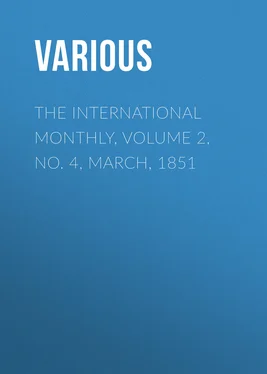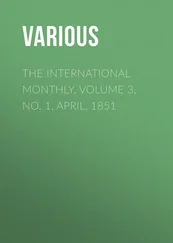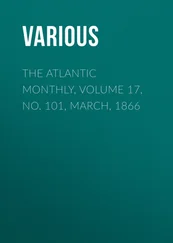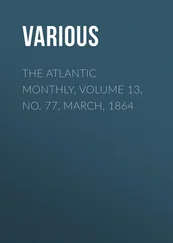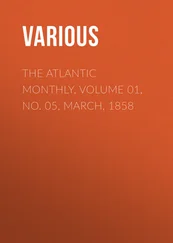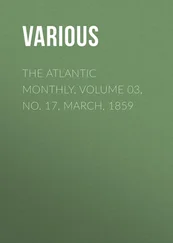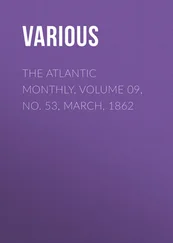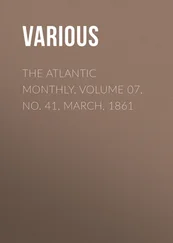Various - The International Monthly, Volume 2, No. 4, March, 1851
Здесь есть возможность читать онлайн «Various - The International Monthly, Volume 2, No. 4, March, 1851» — ознакомительный отрывок электронной книги совершенно бесплатно, а после прочтения отрывка купить полную версию. В некоторых случаях можно слушать аудио, скачать через торрент в формате fb2 и присутствует краткое содержание. Жанр: foreign_antique, periodic, foreign_edu, на английском языке. Описание произведения, (предисловие) а так же отзывы посетителей доступны на портале библиотеки ЛибКат.
- Название:The International Monthly, Volume 2, No. 4, March, 1851
- Автор:
- Жанр:
- Год:неизвестен
- ISBN:нет данных
- Рейтинг книги:5 / 5. Голосов: 1
-
Избранное:Добавить в избранное
- Отзывы:
-
Ваша оценка:
- 100
- 1
- 2
- 3
- 4
- 5
The International Monthly, Volume 2, No. 4, March, 1851: краткое содержание, описание и аннотация
Предлагаем к чтению аннотацию, описание, краткое содержание или предисловие (зависит от того, что написал сам автор книги «The International Monthly, Volume 2, No. 4, March, 1851»). Если вы не нашли необходимую информацию о книге — напишите в комментариях, мы постараемся отыскать её.
The International Monthly, Volume 2, No. 4, March, 1851 — читать онлайн ознакомительный отрывок
Ниже представлен текст книги, разбитый по страницам. Система сохранения места последней прочитанной страницы, позволяет с удобством читать онлайн бесплатно книгу «The International Monthly, Volume 2, No. 4, March, 1851», без необходимости каждый раз заново искать на чём Вы остановились. Поставьте закладку, и сможете в любой момент перейти на страницу, на которой закончили чтение.
Интервал:
Закладка:
Mr. Boker's tragedy of Colaynos, has just been produced at the Walnut-st. Theatre in Philadelphia, and extremely well received. It had indeed a successful run. The Betrothal, which in our last we omitted to notice, is, we understand, to be brought out under the auspices of Charles Kean, in London. Mr. B. has yet another comedy quite finished, which will soon be performed in New-York.
A letter purporting to be by General Washington, and bearing date Cambridge, June 24, 1776, was read before the New-Jersey Historical Society a few weeks ago; the thanks of the Society were voted to Mr. Chetwood for it; and the Literary World characterizes it as "interesting," "admirable," &c. The Literary World does not, we believe, pretend to be an authority in such matters, but that a "historical society" should receive such a gross imposition is somewhat surprising. The letter is as much a forgery and imposture as the "exceedingly interesting letter from General Washington to his wife," published a few months ago in the Day Book . Without going into any further statement or argument on this subject, it may be sufficient to remark, that Washington was not within two hundred miles of Cambridge on the 24th of June, 1776.
The Rev. Henry W. Ducachet, D.D., the learned rector of St. Stephen's, in Philadelphia, has been several years engaged upon a Dictionary of the Church, which is now nearly ready for publication. Such a work is properly but a system and history of doctrine and ritual, in a form suited for the readiest consultation, and it demands, therefore, for its successful accomplishment, the highest and rarest faculties and acquisitions. Dr. Ducachet possesses in a very eminent degree, not only the requisite knowledge and judgment, but he has a certain temperament and felicity, with a love of and skill in dialectics, which promise even to the articles for a dictionary, from his hand, the utmost raciness and attractive interest. We understand this work will be very complete and voluminous.
The Poems of "Edith May," the finest artist among the literary women of this country, are to be published in a very beautiful edition next summer by E. H. Butler of Philadelphia.
The American Philosophical Society, which on account of some unfortunate investments of its capital, has for several years been compelled to suspend its publications, is now, we are gratified to be informed, again in a good financial condition, and new volumes of its important Transactions are in the press.
Professor Hows, during the last month, has given a very interesting series of readings from Shakspeare, in which he has displayed not only the finest capacity for histrionic effect, but a critical sagacity, and a thorough knowledge of the greatest of the poets, which justify his own reputation.
Mr. Redfield has in press "The Celestial Telegraph, or Secrets of the Life to Come, revealed through Magnetism, by M. Cahagnet," a book of the class of Mrs. Crowe's "Night Side of Nature;" and "The Volcano Diggings, a Tale of California Law, by a member of the Bar."
We believe it is about six years since the Rev. William W. Lord, then a resident graduate at Princeton College, published the volume of poems by which he was introduced to the literary world. That book had various and striking merits, and though it had many defects in an artistic point of view, upon the whole it illustrated a just apprehension of the poetic principle, and such capacities for execution as justified the sanguine hopes it occasioned among his friends of his future eminence in the highest and finest of the arts. From that time until the present, Mr. Lord has not appeared as an author; but the leisure that could be withdrawn from professional study has been devoted to the composition of " Christ in Hades ," (Appleton & Co.) a poem displaying his best abilities in art, while it is a suitable offering to religion.
"It was my purpose," he says, "in undertaking this work, to give poetic form, design, and history to the descent of Christ into hell; a fact that has for so many ages attracted the curiosity of the human mind, as to furnish occasion for surprise that the attempt has not hitherto been made. As regards the end for which He descended, I have adhered to the Christian tradition that it was to free the souls of the ancient saints confined in the temporal paradise of the Under-world, embracing also in my design the less general opinion, that it was to demonstrate His universal supremacy by appearing among the damned.
"A source of additional human interest was suggested by the relation which men, as a distinct order of beings, might be supposed to sustain to demons in the place of their common doom, and under new conditions of existence; such, I conceived, as would make it possible in some degree to realize even the divine fictions of the Greek mythology, under the forms and with the attributes accorded them by ancient religions, and by the poetry of all time. This could not fail to suggest the further conception of introducing the divinities of our forefathers, and of other great families of mankind, thus bringing together in action and contrast the deified men, or various representatives of an heroic humanity, among different races: nor did it seem too great a stretch of imaginative probability to conceive that their general characteristics might be adopted and imitated by beings already invested by the human mind with an indefinite power, and inhabiting a world in which the wonderful becomes the probable.
"But it is, after all, the general purpose of exhibiting the triumph of moral power over all physical and inferior spiritual force, in the descent of Christ into hell, which gives my design the complex character of a mythic, heroic, and Christian poem, and, at the same time, constitutes the unity of its parts. The ancients, whose representative types I introduce, knew and appreciated but two kinds of power, brute or physical, and spiritual, including all occult and supernatural efficacy, and strength of intellect and will. Virtue, triumphant by the aid of adventitious force, or relying upon unconquerable pride and disdain to resist it, was the highest reach of their dynamic conceptions. Moral power is properly a Christian idea. It is not, therefore, without what I conceive to be a true as well as a poetic apprehension of the design of the Descent into Hell, that the heroes of profane, and the not fabulous Titans of sacred antiquity, by their rivalries and contentions, brought together in arms for a trial of their comparative strength, are suddenly confronted with a common and dissimilar antagonist, and 'all strength, all terror, single or in bands, that ever was put forth' opposed to that novel, and, save in the Temptation, hitherto untested power, represented by Christ, the author of the theory and master of the example.
"He is not supposed to appear among them 'grasping in his hand ten thousand thunders,' but endued with an equal power, the result and expression of perfect virtue and rightful authority. His triumph is attributed neither to natural, nor to supernatural power; but to moral superiority, evincing itself in His aspect, and exercising its omnipotence upon the soul and conscience. That in the conception of a great Christian poet, His appearance among the rebel angels in Heaven was distinguished by the former attributes, is due, perhaps, to the heroic prejudice of a mind thoroughly imbued with the spirit of pagan writers, and of the Hebrew Scriptures."
The volume opens with this noble invocation, in which there is fit recognition of Dante and Milton, whose lips aforetime for such song had been touched by the divinest fire:
Thou of the darkness and the fire, and fame
Avenged by misery and the Orphic doom,
Bard of the tyrant-lay! whom dreadless wrongs,
Impatient, and pale thirst for justice drove,
A visionary exile, from the earth,
To seek it in its iron reign—O stern!
And not accepting sympathy, accept
A not presumptious offering, that joins
That region with a greater name: And thou,
Of my own native language, O dread bard!
Who, amid heaven's unshadowed light, by thee
Supremely sung, abidest—shouldst thou know
Who on earth with thoughts of thee erects
And purifies his mind, and, but by thee,
Awed by no fame, boldened by thee, and awed—
Not with thy breadth of wing, yet with the power
To breathe the region air—attempts the height
Where never Scio's singing eagle towered,
Nor that high-soaring Theban moulted plume,
Hear thou my song! hear, or be deaf, who may.
Интервал:
Закладка:
Похожие книги на «The International Monthly, Volume 2, No. 4, March, 1851»
Представляем Вашему вниманию похожие книги на «The International Monthly, Volume 2, No. 4, March, 1851» списком для выбора. Мы отобрали схожую по названию и смыслу литературу в надежде предоставить читателям больше вариантов отыскать новые, интересные, ещё непрочитанные произведения.
Обсуждение, отзывы о книге «The International Monthly, Volume 2, No. 4, March, 1851» и просто собственные мнения читателей. Оставьте ваши комментарии, напишите, что Вы думаете о произведении, его смысле или главных героях. Укажите что конкретно понравилось, а что нет, и почему Вы так считаете.
